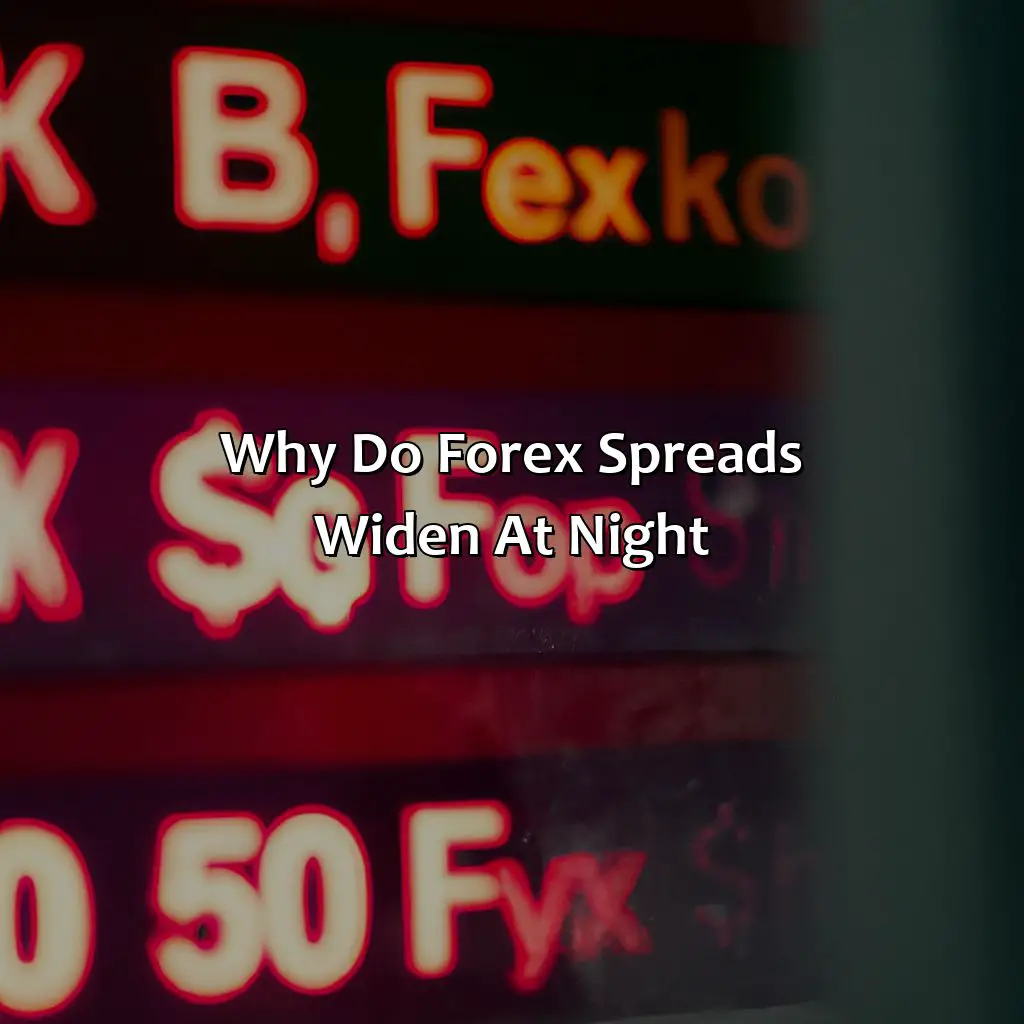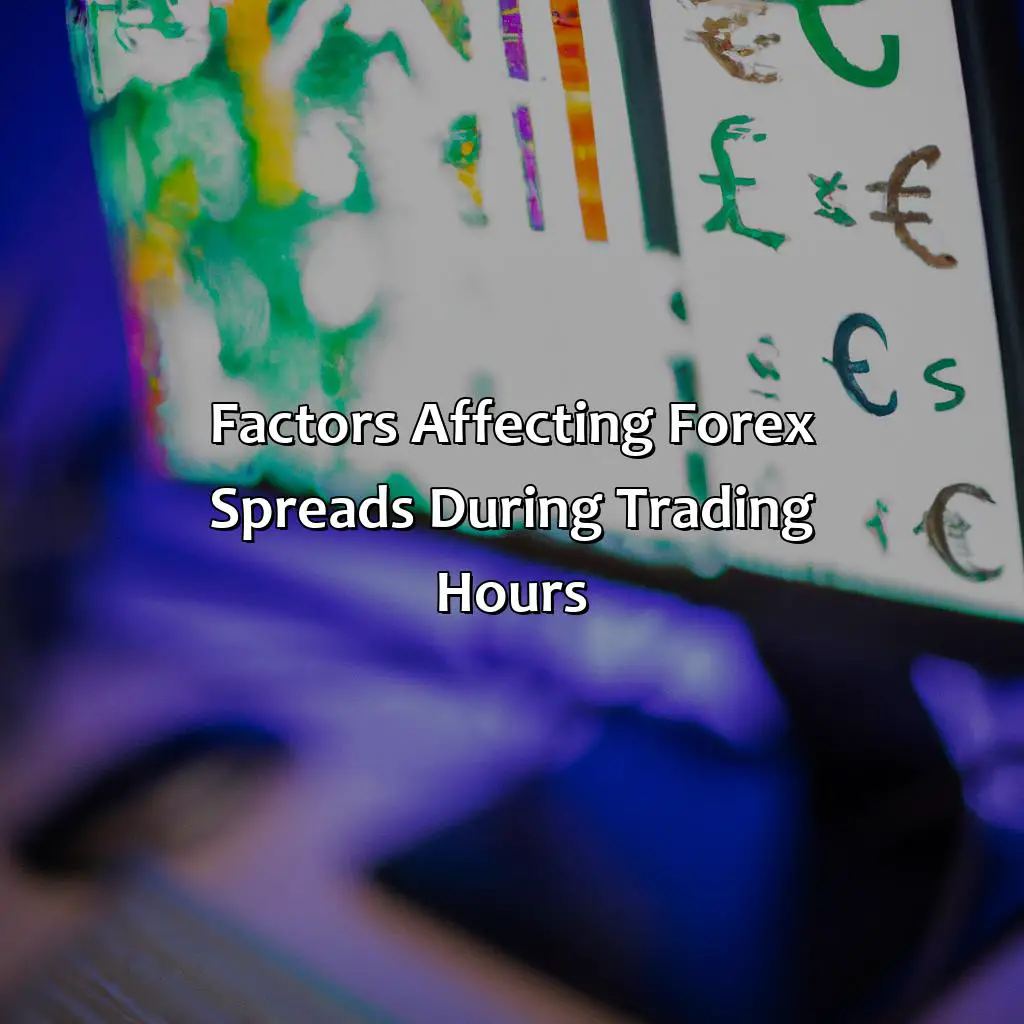
Key Takeaway:
- Forex spreads widen at night due to low trading volumes and liquidity. This means there is a limited availability of liquidity providers, causing wider bid-ask spreads, overnight gaps, and slippage handling issues. Market volatility controls and risk limits may also widen forex spreads at night, leading to higher trading costs.
- To minimize the impact of widened spreads at night, traders should plan their trading strategy in advance, choose a reputable broker with competitive pricing and reliable execution, and use limit orders to enter and exit trades at predefined prices. Technical, fundamental, and sentiment analysis can also help traders manage their risk and optimize their entries and exits.
- Understanding forex spreads and how to manage them effectively is crucial for successful trading. Traders must develop a trading plan, manage their risk carefully, and maintain consistency and discipline in their approach. Emotion management and avoiding impulsive trades are also important factors in achieving long-term profitability.
What are forex spreads and why do they matter?

Photo Credits: forexbrokerreport.com by Nicholas Lopez
Forex spreads are the difference between the bid and ask prices for currency pairs. They matter because they impact the cost of trading and can affect profits. Spreads can widen at night due to lower liquidity, which can be caused by market makers and liquidity providers adjusting their prices, and trading algorithms reacting to price action. This can lead to slower order execution and higher trading fees, including swap rates and overnight financing. To optimize trading in these conditions, use a trading platform with competitive spreads and consider adjusting trading strategies to suit changing market conditions.
Pro Tip: Keep an eye on news and economic events that can impact liquidity and price volatility.
Factors affecting forex spreads during trading hours

Photo Credits: forexbrokerreport.com by Dennis Rivera
To comprehend why forex spreads differ during trading hours, you should analyze several factors. Liquidity, volatility, trading sessions, news releases, and economic events are key in determining the spread. In this section, we will look into different subsections to provide you with knowledge on how trading volume, liquidity, market volatility, economic events, and broker competition affect the spread.
Trading volume and liquidity
Low Trading Volumes and Liquidity Pool in Forex Markets
In forex trading, the order flow or buying and selling activity through a broker influences liquidity pool and market depth. Trading volume and liquidity are the foremost aspects of forex spreads. A rise in volume decreases spread due to enhanced order matching and an ample supply of buyers/sellers. Contrastingly, low trading volumes narrow the gap between bid-ask prices resulting in widened spreads.
Consider a scenario where ‘Broker A’ sells the EUR/USD pair with a spread of 2 pips while ‘Broker B’ sells the same pair with a spread of 1 pip. In such situations, traders tend to choose the second broker for placing trades. Hence, brokers strive to offer competitive pricing with greater liquidity to attract traders.
Table:
| Broker | Bid Price | Ask Price | Spread |
|---|---|---|---|
| A | 1.20050 | 1.20052 | 2 pips |
| B | 1.20050 | 1.20051 | 1 pip |
The increased spread is not always an outcome of low trading volumes or inadequate liquidity pool but may be caused by market volatility and economic events, as explained in the next segment.
Furthermore, understanding how forex spreads operate helps traders tweak their trading strategies accordingly to achieve desirable outcomes rather than blindly relying on chance.
Fact: According to Investopedia, “Forex brokers make money either from charging commissions on trades or by widening the bid-ask spread.”
If you’re not careful, market volatility and economic events can turn your trading strategy into a gamble at 3am.
Market volatility and economic events
Understanding the impact of market volatility and economic events is crucial for effective risk management. Experienced traders often use stop-loss orders and take-profit orders to close trades automatically if the market moves against them or reaches a desired profit level. These tools provide an added layer of protection against unpredictable price movement.
A word of caution about relying too heavily on economic calendar events, though. While important indicators reveal certain trends you want to keep an eye on (for instance, a decrease in GDP may raise a red flag), there’s one significant caveat: be aware that this can result in slippage when news unexpectedly affects liquidity levels.
Pro Tip: Keep yourself informed about critical economic indicators through credible sources like Bloomberg, Reuters etc., so that you can execute trades based on timely insights.
Choosing the right broker can make all the difference in keeping your trading fees low and your profits high.
Broker competition and pricing strategies
Forex brokers are in a state of constant competition with each other, and this competition often leads to changes in pricing strategies. These strategies can be reflected in various trading fees such as swap rates, rollover fees, and interest rates. Forex brokers may use different types of execution models such as liquidity aggregation, ECN, STP, NDD or DMA to attract clients with varying needs like institutional or retail trading experience.
In order to attract more customers, some forex brokers may offer tighter spreads than their competitors. Tight spreads can result in lower costs for traders and improve the overall trading experience. Some brokers also offer 0 pip fixed spreads on some majors but rounding trades when applying swaps or any other charges cause short-term gains while magnifying the long-term losses.
Brokers having an edge over market movements acquire information beforehand from various news sources that enable them to drive prices in one direction over another; it may result in better buying or selling opportunities for their traders but at times offering unrealistic pip values convinces novice traders to enter into positions they would have otherwise avoided.
Pro Tip: Check multiple broker quotes before choosing as most of the time misleading headline quotes are changed after talking with sales reps, costing you significant amount of money if not handled carefully!
Night trading can be a risky business thanks to limited liquidity providers, overnight gaps, and market volatility – make sure your risk limits and margin requirements are up to scratch.
Why do forex spreads widen at night?

Photo Credits: forexbrokerreport.com by Mason Nguyen
Why do forex spreads widen at night? To answer this question, we must consider limited liquidity providers, volatility in certain time zones, & reduced trading volumes & liquidity.
We will look at 3 sub-sections to explain why this occurs & how to solve it:
- Low trading volumes & imbalance of orders.
- Higher market volatility during certain time zones & strategies to use.
- Availability of liquidity providers, including types of liquidity providers & how they affect forex trading.
Less trading volume and liquidity
Low market participation and liquidity can have a significant impact on forex spreads. When there are few participants actively trading, it creates an imbalance between buy and sell orders, causing prices to fluctuate rapidly. Institutions may seek out dark pools where they can trade without revealing their intentions. This means that fewer orders are visible in the open market, leading to lower liquidity levels. As a result, spreads widen as brokers raise their bid-ask prices to maintain healthy profit margins.
- Low trading volumes
- Institutional trading
- Order imbalance
- Limited availability of buyers and sellers
- Reduced price discovery mechanism
Despite investing in sophisticated electronics systems capable of executing trades at high speeds, low-volume periods remain problematic. Spreads during these times tend to be wider, making it difficult for traders to execute profitable trades since they must overcome larger bid-ask differentials. However, dark pools provide some solace for institutional investors who may prefer not to affect the broader market or give away their positions.
To minimize the impact of widened spreads at night:
- Plan your trades beforehand based on expected market activity.
- Choose highly reputable brokers with competitive pricing models and reliable execution standards.
- Make use of order types conditionally such as limit orders or stop-loss orders so that you enter or exit from positions at specific prices.
Managing forex spreads is an important aspect of successful trading that cannot be overemphasized. Recognizing the factors affecting spreads provides Forex traders an edge in understanding how and when the markets move and how brokerages price them accordingly. By being aware of low trading volume and liquidity situations, traders can anticipate when spreads will widen and adjust their strategies accordingly to maintain profitability.
Trading during high volatility market hours requires a range of technical tools and strategies for successful returns.
Higher market volatility in certain time zones
Market activity and volatility vary across different global time zones. Forex spreads tend to widen at night due to the higher market volatility in certain time zones. Market participants experience increased trading volumes and market activity during overlapping market hours. This can result in large price fluctuations that affect spreads.
During specific hours, for instance, when Asian markets are open, forex spreads tend to widen due to the currency correlation between the Japanese yen and other major currencies. Market volatility coincides with news releases, such as central bank announcements and economic data publications. These events impact both liquidity and spreads.
In addition, arbitrage traders may exploit price discrepancies between major financial markets during off-peak trading hours. Similarly, breakout traders may attempt to enter trades shortly before or after important announcements. Trend following and range trading strategies may also be affected by widened spreads at night-time hours.
It is also important to note that limited availability of liquidity providers may lead to higher spreads during low-activity hours, which include nights and weekends. This is particularly true for emerging market currencies whose liquidity tends to be lower than that of major currency pairs.
A study by Investopedia shows that with a broker like IG Markets, the average spread on the EUR/USD pair was 0.70 pips during peak trading hours compared to 1 pip outside market hours showing a wider spread beyond reasonable intervals in forex trading.
As a trader, it is essential that you understand how forex spreads work and how they can impact your trades at different times of the day. By choosing a reputable broker with competitive pricing structures, understanding technical analysis techniques such as candlestick analysis or Fibonacci retracements, and developing an effective strategy using integral analysis tools such as momentum indicators or volume analysis; traders can manage their risk better by factoring-in widened forex spread pressures from unwarranted overnight trades, thus ensuring successful trades over longer periods of time while mitigating operational costs in regards to bid-ask spread variance deficits driving losses to maintain sustainable capital investments.
With limited availability of liquidity providers, forex brokers face a difficult time ensuring optimal execution and narrow spreads.
Limited availability of liquidity providers
Limited access to market makers and liquidity providers is a significant factor contributing to widened forex spreads at night. Every forex trade requires execution through a market maker or liquidity provider, which can aggregate liquidity from various sources, including banks and other financial institutions. ECN, STP, NDD, DMA are some of the channels by which institutional and retail traders execute their trades with many reputable forex brokers.
During low-liquidity periods such as market close hours and weekends, the number of liquidity providers dwindles causing an increase in spreads. This can result in higher trading costs for traders compared to when there are more accessible sources of liquidity.
Pro Tip: Traders may choose to avoid trading during low-liquidity periods or opt for platforms with high-probability trade signals that negate the lower volume of trades traded at night hours.
Don’t let widened spreads catch you off guard at night, use a combination of trading strategies and risk management tools like stop-loss and take-profit orders, technical, fundamental, and sentiment analysis, order book and open interest analysis.
How to minimize the impact of widened spreads at night

Photo Credits: forexbrokerreport.com by Daniel Moore
Minimize the impact of wide forex spreads at night by planning beforehand. Think about trading strategies, risk management, stop-loss orders, take-profit orders, technical analysis, fundamental analysis, and sentiment analysis.
Find a reliable forex broker with competitive pricing and reliable execution. Consider things like forex brokers, trading platforms, trading fees, swap rates, rollover fees, API trading, FIX protocol, liquidity aggregation, ECN, STP, NDD, DMA, institutional trading, and retail trading.
Also, use limit orders to enter and exit trades at predefined prices. Consider order execution, order book, open interest, and order imbalance.
Plan your trading strategy in advance
To ensure effective forex trading, you need to have a well-planned trading strategy. This will help you minimize risks and optimize profits. Therefore, it is essential to prepare your trading approach before the trading hours commence.
Here’s how you can plan your forex trading strategies in advance:
- Conduct technical analysis using historical price data to identify potential trades.
- Do fundamental analysis to understand the economic conditions that might affect the currency pair you are interested in.
- Use sentiment analysis of market news and social media trends to make informed decisions.
- Determine risk management techniques such as use of stop-loss orders and take-profit orders.
By planning your forex trading strategies in advance, you are giving yourself the best chance of success. Having a solid strategy will enable you to stay focused on your goals and avoid unnecessary emotional responses that could lead to impulsive trading.
Additionally, Pro Tip – documenting your trading plans can help evaluate their effectiveness for future reference.
Find a forex broker that offers more than just low fees and swap rates – look for features like liquidity aggregation, API trading, and STP/DMA execution to ensure reliable and efficient trading.
Choose a reputable broker with competitive pricing and reliable execution
When selecting a forex broker, it is crucial to consider their pricing and execution policies. Opt for forex brokers with competitive pricing and reliable execution in order to enhance your trading experience. It is recommended to select forex brokers who offer transparent and comprehensive information on their trading fees, swap rates, rollover fees, API trading integration, FIX protocol integration, liquidity aggregation options, as well as the types of trading platforms they provide such as ECN/STP/NDD/DMA models.
The chosen forex broker should have a good reputation in the industry and serve both institutional and retail traders. This ensures that you are getting access to quality services irrespective of your level of trading expertise or account size. An efficient customer support team that provides quick resolutions to queries should also be a priority when choosing a forex broker.
A Pro Tip would be to look for reviews of the shortlisted brokers on reliable forums or social media sites before opening an account with them. This will provide insights into the experiences of other traders who have used the broker’s services in real-time.
Take charge of your trades with limit orders, ensuring precise execution and avoiding the pitfalls of order book imbalance and open interest.
Use limit orders to enter and exit trades at predefined prices
Limit orders are a type of order that allows traders to set a predetermined price at which they would like to enter or exit a trade. This helps manage risk and reduce market exposure by ensuring trades are executed at a specific price, regardless of market volatility.
Here is a 5-step guide on how to use limit orders to enter and exit trades:
- Determine your desired entry or exit price based on technical analysis, fundamental factors, or overall market conditions.
- Place your order with your broker using the limit order option.
- Your limit order will then be added to the order book and will remain there until it is either executed or canceled by you.
- Once the market reaches your desired entry or exit price, your limit order will be triggered and executed automatically.
- Monitor open interest and order imbalance regularly to adjust your limit orders as needed.
It’s important to note that while limit orders can help reduce risks associated with volatile markets, they may not always guarantee execution due to fluctuations in trading volume and liquidity.
While limit orders can be an effective tool for managing trading risks, staying up-to-date on changes in market conditions is essential for success. Traders may consider monitoring open interest and order imbalance regularly, as this can provide valuable insights into potential changes in market sentiment.
For example, one trader found success using limit orders during periods of heightened volatility in the foreign exchange markets by closely monitoring these indicators and adjusting their positions accordingly. By proactively managing risk with these strategies, they were able to maximize profits while minimizing losses in challenging trading environments.
Some Facts About Why Do Forex Spreads Widen at Night:
- ✅ Forex spreads widen at night due to lower trading volume and liquidity. (Source: The Balance)
- ✅ Market volatility can also lead to wider spreads during night trading hours. (Source: Investopedia)
- ✅ Night trading sessions in different time zones can impact spread widening, as traders in one region react to news or events that affect currency values. (Source: FXCM)
- ✅ Reduced staff and resources at banks and other financial institutions during overnight hours can contribute to wider spreads. (Source: DailyFX)
- ✅ Some forex brokers may widen spreads intentionally at night as a way to increase their profits. (Source: ForexTraders)
FAQs about Why Do Forex Spreads Widen At Night?
Why do forex spreads widen at night?
Forex spreads widen at night due to increased volatility, lower trading activity, and lower market liquidity. During the Asian session, currency prices can be affected by news and events from the U.S. and Europe, which can cause prices to move sharply, leading to wider spreads. The European session can also have higher volatility due to important economic data releases such as inflation and employment figures.
What are some tips to reduce the impact of wider spreads during volatile times?
During volatile times, it is important to be aware of upcoming news and economic releases, and adjust your trading strategy accordingly. Consider using limit orders to enter trades at your desired price rather than relying on market orders. Be aware of the spreads and trade only when they are at their narrowest.
What can be the impact of wider spreads on my trades?
Wider spreads can result in higher trading costs and may make it more difficult to enter and exit trades at your desired price. They can also lead to slippage, where your order is executed at a price different from the one you expected. This can result in losses for the trader.
Are Asian and European sessions equally affected by wider spreads?
No, during the Asian session, spreads can widen more due to news and events that occur in the U.S. and Europe. In contrast, during the European session, important economic data releases such as inflation and employment figures can cause higher volatility and wider spreads.
How can I prepare for wider spreads during night trading?
Be aware of upcoming news releases and their potential impact on the market. Consider reducing your position size or avoiding trading during periods of low market liquidity. Use limit orders to enter trades at your desired price, and avoid making impulsive trades based solely on wider spreads.
Conclusion
Wider spreads are a common feature of night trading due to lower market liquidity and increased volatility. Traders should be aware of upcoming news releases and adjust their trading strategy accordingly. By using limit orders and being mindful of trading costs, traders can work to minimize the impact of wider spreads on their trading activity.

